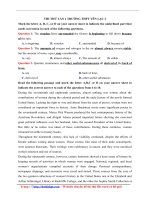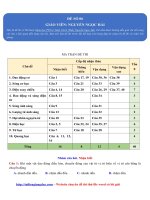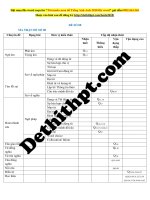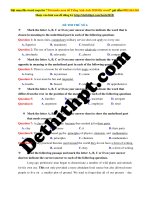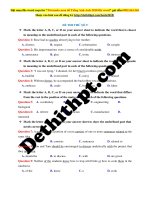BỘ đề THI THPT QUỐC GIA CHUẨN cấu TRÚC bộ GIÁO môn tiếng anh gv nguyễn quỳnh trang file word có lời giải chi tiết đề số (9)
Bạn đang xem bản rút gọn của tài liệu. Xem và tải ngay bản đầy đủ của tài liệu tại đây (365.78 KB, 18 trang )
Đặt mua file word soạn tin “Tôi muốn mua đề Tiếng Anh Anh 2018 file word” gửi đến 0982.563.365
Hoặc vào link sau để đăng ký />ĐỀ THI THỬ SỐ 9
Mark the letter A, B, C, or D on your answer sheet to indicate the word that is closest
in meaning to the underlined part in each of the following questions.
Question 1: Rose had no qualms about lying to her mother.
A. distress
B. respect
C. information
D. scruple
Question 2: His impersonations were a source of considerable mirth.
A. annoyance
B. glee
C. irony
D. mistrust
Mark the letter A, B, C, or D on your answer sheet to indicate the word that is opposite
in meaning to the underlined part in each of the following questions.
Question 3: “I was not lying," I shouted, for her brazen coolness provoked me.
A. bashful
B. overexcited
C. noisy
D. heated
Question 4: Without demur, he accompanied the bad robber toward the harbour.
A. embrace
B. crude
C. boisterous
D. falter
Mark the letter A, B, C, or D on your answer sheet to indicate the word that differs
from the rest in the position of the main stress in each of the following questions.
Question 5:
A. vocabulary
B. influential
C. engineering
D.
A. referee
B. electrician
C. manufacture
D.
biological
Question 6:
immortal
Mark the letter A, B, C, or D on your answer sheet to show the underlined part that
needs correction
Question 7: A paragraph is a portion of a text consists of one or more sentences related to the
same idea.
A. paragraph
B. consists
C. sentences
D. related to
Question 8: Tim and Tam should be encouraged to discuss analytically with the project that
they are given.
A. should be
B. to discuss
C. with
D. are given
Question 9: Neither of the students know how to trap wild birds or how to cook them in the
rainforest.
A. of the
B. know
C. o
D. cook
Đặt mua file word soạn tin “Tôi muốn mua đề Tiếng Anh Anh 2018 file word” gửi đến 0982.563.365
Hoặc vào link sau để đăng ký /> Read the following passage and mark the letter A, B, C or D on your answer sheet
to indicate the correct answer to each of the following questions from 10 to 16.
In addition to providing energy, fats have several other functions in the body. The fat
soluble vitamins, A, D, E, and K, are dissolved in fats, as their name implies. Good sources
of these vitamins have high oil or fat content, and the vitamins are stored in the body’s fatty
tissues. In the diet, fats cause food to remain longer in the stomach, this increasing the
feeling of fullness for some time after a meal is eaten. Fats add variety, taste and texture to
foods, which accounts for the popularity of fried foods. Fatty deposits in the body have an
insulating and protective value. The curves of the human female body are due mostly to
strategically located fat deposits.
Whether a certain amount of fat in the diet is essential to human health is not definitely
known. When rats are fed a fat-free diet, their growth eventually ceases, their skin becomes
inflamed and scaly, and their reproductive systems are damaged. Two fatty acids, linoleic
and acids, prevent these abnormalities and hence are called essential fatty acids. They also
are required by a number of other animals but their roles in human beings are debatable.
Most nutritionists consider linoleic fatty acid an essential nutrient for humans.
Question 10: This passage probably appeared in which of the following?
A. A diet book
B. A book on basic nutrition
C. A cookbook
D. A popular women’s magazine
Question 11: The phrase “stored in” in lines 3 is closest in meaning to ________.
A. manufactured in
B. attached to
C. measured by
D. accumulated
Question 12: The author states that fats serve all of the following body functions EXCEPT to
________.
A. promote a feeling of fullness
B. insulate and protect the body
C. provide energy
D. control weight gain
Question 13: According to the author of the passage, which of the following is true for rats
when they are fed a fat free diet?
A. They stop growing
B. They have more babies
C. They lose body hair
D. They require less care
Question 14: Linoleic fatty acid is mentioned in the passage as ________.
Đặt mua file word soạn tin “Tôi muốn mua đề Tiếng Anh Anh 2018 file word” gửi đến 0982.563.365
Hoặc vào link sau để đăng ký />
A. an essential nutrient for humans
B. more useful than acid
C. prevent weight gain in rats
D. a nutrient found in most foods
Question 15: The phrase “these abnormalities” in line 11 refers to ________.
A. a condition caused by fried foods
B. strategically located fat deposits
C. curves on the human female body
D. cessation of growth, bad skin, and damaged reproductive systems
Question 16: That humans should all have some fat in our diets is, according to the author
A. a commonly held view
B. not yet a proven fact
C. only true for women
D. proven to be true by experiments on rats
Read the following passage and mark the letter A, B, C, or D to indicate the best
option for each of the blanks.
From the seeds themselves to the machinery, fertilizers and pesticides - The Green
Revolution regimen depend heavily on technology. One (17)________, however, depends much
more on technology - organic farming. Many organic farmers use machinery, but (18) ________
chemical fertilizers or pesticides. (19) ________ chemical soil enrichers, they use animal manure
and plant parts not used as food - natural, organic fertilizers that are clearly a renewable (20)
________. Organic farmers also use alternatives for pesticides; for example, they may rely (21)
________ natural predators of certain insect pests. Then, the need arises, they can buy the eggs
and larvae of these natural predators and introduce them into their crop fields.
Question 17: A. alternative B. alternate
C. alteration
D. alternation
Question 18: A. also
C. not
D. all
Question 19: A. In spite of B. On account of
C. In favour of
D. Instead of
Question 20: A. resource
B. source
C. matter
D. substance
Question 21: A. of
B. to
C. on
D. in
B. for
Read the following passage and mark the letter A, B, C or D on your answer sheet
to indicate the correct answer to each of the following questions from 22 to 28.
An air pollutant is defined as a compound added directly or indirectly by humans to the
atmosphere in such quantities as to affect humans, animals, vegetation, or materials
adversely. Air pollution requires a very flexible definition that permits continuous change.
When the first air pollution laws were established in England in the fourteenth century, air
pollutants were limited to compounds that could be seen or smelled - a far cry from the
Đặt mua file word soạn tin “Tôi muốn mua đề Tiếng Anh Anh 2018 file word” gửi đến 0982.563.365
Hoặc vào link sau để đăng ký />
extensive list of harmful substances known today. As technology has developed and
knowledge of the health aspects of various chemicals has increased, the list of air pollutants
has lengthened. In the future, even water vapor might be considered an air pollutant under
certain conditions.
Many of the more important air pollutants, such as sulfur oxides, carbon monoxide, and
nitrogen oxides, are found in nature. As the Earth developed, the concentration of these
pollutants was altered by various chemical reactions; they became components in
biogeochemical cycles. These serve as an air purification scheme by allowing the
compounds to move from the air to the water or soil. On a global basis, nature's output of
these compounds dwarfs that resulting from human activities.
However, human production usually occurs in a localized area, such as a city. In such a
region, human output may be dominant and may temporarily overload the natural
purification scheme of the cycles. The result is an increased concentration of noxious
chemicals in the air. The concentrations at which the adverse effects appear will be greater
than the concentrations that the pollutants would have in the absence of human activities.
The actual concentration need not be large for a substance to be a pollutant; in fact, the
numerical value tells us little until we know how much of an increase this represents over the
concentration that would occur naturally in the area. For example, sulfur dioxide has
detectable health effects at 0.08 parts per million (ppm), which is about 400 times its natural
level. Carbon monoxide, however, has a natural level of 0.1 ppm and is not usually a
pollutant until its level reaches about 15 ppm.
Question 22: What does the passage mainly discuss?
A. The economic impact of air pollution.
B. What constitutes an air pollutant.
C. How much harm air pollutants can cause.
D. The effects of compounds added to the atmosphere.
Question 23: It can be inferred from the first paragraph that ________.
A. water vapor is an air pollutant in localized areas
B. most air pollutants today can be seen or smelled
C. the definition of air pollution will continue to change
D. a substance becomes an air pollutant only in cities
Đặt mua file word soạn tin “Tôi muốn mua đề Tiếng Anh Anh 2018 file word” gửi đến 0982.563.365
Hoặc vào link sau để đăng ký />
Question 24: For which of the following reasons can natural pollutants play an important
role in controlling air pollution?
A. They function as part of a purification process.
B. They occur in greater quantities than other pollutants.
C. They are less harmful to living beings than other pollutants.
D. They have existed since the Earth developed.
Question 25: According to the passage, human-generated air pollution in localized regions
________.
A. can be dwarfed by nature's output of pollutants
B. can overwhelm the natural system that removes pollutants
C. will damage areas outside of the localized regions
D. will react harmfully with natural pollutants
Question 26: The word “localized” in the third paragraph is closest in meaning to ________.
A. specified
B. circled
C. surrounded
D. encircled
Question 27: According to the passage, the numerical value of the concentration level of a
substance is only useful if ________.
A. the other substances in the area are known
B. it is in a localized area
C. the natural level is also known
D. it can be calculated quickly
Question 28: Which of the following is best supported by the passage?
A. To effectively control pollution, local government should regularly review their air
pollution laws.
B. One of the most important steps in preserving natural lands is to better enforce air pollution
laws.
C. Scientists should be consulted in order to establish uniform limits for all air pollutants
D. Human activities have been effective in reducing air pollution.
Mark the letter A, B, C, or D on your answer sheet to indicate the correct answer to
each of the following questions.
Question 29: The old lady ________ somebody in the factory had stolen her golden necklet,
but although the police searched everyone in the factory, it wasn’t found.
A. impose
B. forced
C. claimed
D. warned
Đặt mua file word soạn tin “Tôi muốn mua đề Tiếng Anh Anh 2018 file word” gửi đến 0982.563.365
Hoặc vào link sau để đăng ký />
Question 30: As Tim was ________ of the modification in the schedule, he arrived an hour
late for the meeting.
A. unaware
B. unconscious
C. unable
D. unreasonable
Question 31: The best invention ________ this year was given to Tim.
A. Reward
B. Brand
C. Factor
D. Award
Question 32: On my Mum’s birthday, the ________ family gathers for lunch, usually at my
mother's house.
A. mere
B. entire
C. total
D. complete
Question 33: When the first Vietnamese restaurants opened in Italy, it was very difficult to
get fresh _______ of Vietnamese vegetables.
A. Contribution
B. materials
C. supplies
D. ingredients
Question 34: Tim finds mending old clothes incredibly _______, that's why he always asks
his mother to do it for him.
A. hilarious
B. tedious
C. funny
������������������������������������������������������������������������������������������������������������������������������������������������������������������������������������������������������������������������������������������������������������������������������������������������������������������������������������������������������������������������������������������������������������������������������������������������������������������������������������������������������������������������������������������������������������������������������������������������������������������������������������������������������������������������������������������������������������������������������������������������������������������������������������������������������������������������������������������������������������������������������������������������������������������������������������������������������������������������������������������������������������������������������������������������������������������������������������������������������������������������������������������������������������������������������������������������������������������������������������������������������������������������������������������������������������������������������������������������������������������������������������������������������������������������������������������������������������������������������������������������������������������������������������������������������������������������������������������������������������������������������������������������������������������������������������������������������������������������������������������������������������������������������������������������������������������������������������������������������������������������������������������������������������������������������������������������������������������������������������������������������������������������������������������������������������������������������������������������������������������������������������������������������������������������������������������������������������������������������������������������������������������������������������������������������������������������������������������������������������������������������������������������������������������������������������������������������������������������������������������������������������������������������������������������������������������������������������������������������������������������������������������������������������������������������������������������������������������������������������������������������������������������������������������������������������������������������������������������������������������������������������������������������������������������������������������������������������������������������������������������������������������������������������������������������������������������������������������������������������������������������������������������������������������������������������������������������������������������������������������������������������������������������������������������������������������������������������������������������������������������������������������������������������������������������������������������������������������������������������������������������������������������������������������������������������������������������������������������������������������������������������������������������������������������������������������������������������������������������������������������������������������������������������������������������������������������������������������������������������������������������������������������������������������������������������������������������������������������������������������������������������������������������������������������������������������������������������������������������������������������������������������������������������������������������������������������������������������������������������������������������������������������������������������������������������������������������������������������������������������������������������������������������������������������������������������������������������������������������������������������������������������������������������������������������������������������������������������������������������������������������������������������������������������������������������������������������������������������������������������������������������������������������������������������������������������������������������������������������������������������������������������������������������������������������������������������������������������������������������������������������������������������������������������������������������������������������������������������������������������������������������������������������������������������������������������������������������������������������������������������������������������������������������������������������������������������������������������������������������������������������������������������������������������������������������������������������������������������������������������������������������������������������������������������������������������������������������������������������������������������������������������������������������������������������������������������������������������������������������������������������������������������������������������������������������������������������������������������������������������������������������������������������������������������������������������������������������������������������������������������������������������������������������������������������������������������������������������������������������������������������������������������������������������������������������������������������������������������������������������������������������������������������������������������������������������������������������������������������������������������������������������������������������������������������������������������������������������������������������������������������������������������������������������������������������������������������������������������������������������������������������������������������������������������������������������������������������������������������������������������������������������������������������������������������������������������������������������������������������������������������������������������������������������������������������������������������������������������������������������������������������������������������������������������������������������������������������������������������������������������������������������������������������������������������������������������������������������������������������������������������������������������������������������������������������������������������������������������������������������������������������������������������������������������������������������������������������������������������������������������������������������������������������������������������������������������������������������������������������������������������������������������������������������������������������������������������������������������������������������������������������������������������������������������������������������������������������������������������������������������������������������������������������������������������������������������������������������������������������������������������������������������������������������������������������������������������������������������������������������������������������������������������������������������������������������������������������������������������������������������������������������������������������������������������������������������������������������������������������������������������������������������������������������������������������������������������������������������������������������������������������������������������������������������������������������������������������������������������������������������������������������������������������������������������������������������������������������������������������������������������������������������������������������������������������������������������������������������������������������������������������������������������������������������������������������������������������������������������������������������������������������������������������������������������������������������������������������������������������������������������������������������������������������������������������������������������������������������������������������������������������������������������������������������������������������������������������������������������������������������������������������������������������������������������������������������������������������������������������������������������������������������������������������������������������������������������������������������������������������������������������������������������������������������������������������������������������������������������������������������������������������������������������������������������������������������������������������������������������������������������������������������������������������������������������������������������������������������������������������������������������������������������������������������������������������������������������������������������������������������������������������������������������������������������������������������������������������������������������������������������������������������������������������������������������������������������������������������������������������������������������������������������������������������������������������������������������������������������������������������������������������������������������������������������������������������������������������������������������������������������������������������������������������������������������������������������������������������������������������������������������������������������������������������������������������������������������������������������������������������������������������������������������������������������������������������������������������������������������������������������������������������������������������������������������������������������������������������������������������������������������������������������������������������������������������������������������������������������������������������������������������������������������������������������������������������������������������������������������������������������������������������������������������������������������������������������������������������������������������������������������������������������������������������������������������������������������������������������������������������������������������������������������������������������������������������������������������������������������������������������������������������������������������������������������������������������������������������������������������������������������������������������������������������������������������������������������������������������������������������������������������������������������������������������������������������������������������������������������������������������������������������������������������������������������������������������������������������������������������������������������������������������������������������������������������������������������������������������������������������������������������������������������������������������������������������������������������������������������������������������������������������������������������������������������������������������������������������������������������������������������������������������������������������������������������������������������������������������������������������������������������������������������������������n favour of: ủng hộ; yêu thích hơn
- instead of: thay vì
“Instead of chemical soil enrichers, they use animal manure and…”
Dịch: Thay vì các chất hoá học làm giàu/phì nhiêu cho đất, họ dùng phân chuồng và…
Question 20: A
- resource (n): nguồn, nguồn tài nguyên
- source (n): nguồn, nguồn gốc; mã nguồn
- matter (n): vấn đề
- substance (n): chất, vật chất
“… they use animal manure and plant parts not used as food - natural, organic fertilizers that
are clearly a renewable resource.”
Dịch: … họ sử dụng phân chuồng và các bộ phận của cây mà không được dùng làm thức ăn –
là phân bón hữu cơ tự nhiên, mà rõ ràng là một nguồn tài nguyên có thể tái tạo được.
Question 21: C
rely on (v): phụ thuộc vào
“… they may rely on natural predators of certain insect pests.”
Dịch: … họ có thể dựa vào những kẻ thù tự nhiên của một số loại sâu bệnh gây hại nhất định.
Question 22: B
Đề: Bài luận bàn luận chủ yếu về vấn đề gì?
A. Tác động về kinh tế của ô nhiễm không khí.
B. Điều gì cấu thành/tạo nên ô nhiễm không khí.
C. Ô nhiễm không khí có thể gây hại nhiều tới mức nào.
D. Tác động của các hợp chất được đưa vào bầu không khí/khí quyển.
Đặt mua file word soạn tin “Tôi muốn mua đề Tiếng Anh Anh 2018 file word” gửi đến 0982.563.365
Hoặc vào link sau để đăng ký />Dựa vào câu mở bài: “An air pollutant is defined as a compound added directly or indirectly
by humans to the atmosphere in such quantities as to affect humans, animals, vegetation, or
materials adversely.”
Dịch: Một chất gây ô nhiễm không khí được định nghĩa là một hợp chất được đưa vào bầu
không khí/khí quyển một cách trực tiếp hoặc gián tiếp bởi con người ở một mức độ mà ảnh
hưởng xấu tới con người, động thực vật hoặc các vật chất.
(Sau đó toàn bài đi sâu phân tích các chất gây ô nhiễm và cách chúng tạo nên ô nhiễm không
khí.)
Question 23: C
Đề: Có thể được suy luận ra từ đoạn văn đầu tiên rằng…
A. hơi nước là một chất gây ô nhiễm không khí ở các khu dân cư
B. hầu hết các chất gây ô nhiễm không khí ngày nay có thể được nhìn thấy hoặc ngửi thấy
C. định nghĩa về ô nhiễm không khí sẽ tiếp tục thay đổi
Dựa vào câu 2: “Air pollution requires a very flexible definition that permits continuous
change.”
Dịch: Sự ô nhiễm không khí đòi hỏi một sự định nghĩa linh hoạt mà cho phép có sự thay đổi
không ngừng/liên tục.
Question 24: A
Đề: Vì lý do nào sau đây mà các chất gây ô nhiễm tự nhiên đóng vai trò quan trọng trong việc
kiểm soát sự ô nhiễm không khí?
A. Chúng hoạt động với chức năng là một phần của quá trình thanh lọc.
B. Chúng xuất hiện với số lượng lớn hơn nhiều so với các chất gây ô nhiễm khác.
C. Chúng ít có hại tới các sinh vật sống hơn so với các chất gây ô nhiễm khác.
D. Chúng đã luôn tồn tại từ khi trái đất hình thành.
Đoạn 2: “Many of the more important air pollutants, such as… are found in nature. As the
Earth developed, the concentration of these pollutants was altered by various chemical
reactions; they became components in biogeochemical cycles. These serve as an air
purification scheme…”
Dịch: Nhiều chất gây ô nhiễm không khí quan trọng/nghiêm trọng hơn, như… được tìm thấy
trong tự nhiên. Khi trái đất hình thành/phát triển, chúng trở thành các thành phần trong các
chu kỳ sinh hoá. Chúng có tác dụng như là một cách thanh lọc không khí…
Question 25: B
Đặt mua file word soạn tin “Tôi muốn mua đề Tiếng Anh Anh 2018 file word” gửi đến 0982.563.365
Hoặc vào link sau để đăng ký />Đề: Theo bài luận, ô nhiễm không khí gây ra bởi con người ở các khu vực tập trung dân cư…
A. có thể được lấn át bởi các chất gây ô nhiễm sinh ra từ tự nhiên.
B. có thể áp đảo hệ thống tự nhiên mà (hệ thống đó) loại bỏ các chất gây ô nhiễm.
C. sẽ gây thiệt hại tới các khu vực ngoài các vùng tập trung dân cư.
D. sẽ phản ứng một cách có hại với các chất gây ô nhiễm tự nhiên.
Đầu đoạn 3: “In such a region, human output may be dominant and may temporarily overload
the natural purification scheme of the cycles.”
Dịch: Ở những vùng như vậy, khí thải do con người có thể chi phối và có thể tạm thời gây
quá tải lên sự thanh lọc tự nhiên của các chu kỳ.
Question 26: A
Đề: Từ “localized” (tập trung dân cư; nội địa hoá; giới hạn khu vực) ở đoạn 3 sát nghĩa nhất
với…
A. specified (P2): xác định
B. circled (P2): được xoay vòng
C. surrounded (P2): được bao quanh
D. encircled (P2): bị bao vây
Question 27: C
Đề: Theo như văn bản, giá trị số của nồng độ của một chất chỉ hữu ích nếu…
A. các chất khác trong khu vực đã được biết
B. nó ở trong một khu xác định
C. mức độ/nồng độ tự nhiên cũng đã được biết
D. nó có thể được tính toán nhanh chóng
Giữa đoạn 3: “… in fact, the numerical value tells us little until we know how much of an
increase this represents over the concentration that would occur naturally in the area.”
Dịch: … trên thực tế, giá trị số không cho ta biết nhiều, cho tới khi ta biết được nó đại diện
cho sự tăng lên nhiều như thế nào trong nồng độ mà sẽ xuất hiện tự nhiên ở khu vực đó.
Question 28: D
Đề: Ý nào sau đây được bổ trợ tốt nhất bởi bài luận?
A. Để kiểm soát ô nhiễm một cách hiệu quả, chính phủ địa phương cần thường xuyên xem
xét lại các luật về ô nhiễm môi trường của họ.
B. Một trong các bước quan trọng nhất trong việc bảo tồn đất đai tự nhiên là thi hành tốt hơn
các luật về ô nhiễm môi trường.
C. Các nhà khoa học nên được hỏi ý kiến để thiết lập những giới hạn đồng bộ cho mọi chất
gây ô nhiễm không khí.
Đặt mua file word soạn tin “Tôi muốn mua đề Tiếng Anh Anh 2018 file word” gửi đến 0982.563.365
Hoặc vào link sau để đăng ký />D. Các hoạt động của con người đã và đang có hiệu quả trong việc giảm thiểu ô nhiễm không
khí.
Question 29: C
- impose (v): đánh thuế
- force (v): bắt buộc
- claim (v): khẳng định, tuyên bố; yêu cầu
- warn (v): cảnh báo, cảnh cáo
Dịch: Người đàn bà lớn tuổi khẳng định ai đó trong công ty đã trộm vòng cổ bằng vàng của
bà ta, nhưng dù cảnh sát đã lục soát tất cả mọi người trong công ty, nó đã không được tìm
thấy.
Question 30: A
- unaware (adj): không biết
- unconscious (adj): bất tỉnh, vô thức
- unable (adj): không thể
- unreasonable (adj): vô lý
Dịch: Vì Tim không biết có sự thay đổi trong lịch trình, anh ấy đã đến cuộc họp muộn một
tiếng.
Question 31: D
- reward (n): phần thưởng
- brand (n): nhãn hiệu
- factor (n): yếu tố
- award (n): giải thưởng
Dịch: Giải thưởng cho phát minh tốt nhất năm nay thuộc về Tim.
Question 32: B.
- mere (adj): chỉ
- entire (adj): toàn thể, toàn bộ
- total (adj): tổng số
- complete (adj): hoàn thiện, hoàn thành
Dịch: Vào ngày sinh nhật của mẹ tôi, toàn thể gia đình tôi ăn trưa cùng nhau, thường là ở nhà
mẹ tôi.
Question 33: C
- provision (n): sự tiếp tế, sự cung cấp
- material (n): vật liệu
- supply (n): nguồn cung
- ingredient (n): nguyên liệu
Dịch: Khi nhà hàng Việt Nam đầu tiên ở Ý được mở ra, đã rất khó để kiếm được nguồn cung
cấp các loại rau tươi Việt Nam.
Question 34: B
- hilarious (adj): nực cười
- tedious (adj): nhàm chán, buồn tẻ
- funny (adj): buồn cười
- recreational (adj): có tính giải trí
Dịch: Tim thấy việc vá quần áo cũ là vô cùng nhàm chán, đó là lý do tại sao anh ấy luôn nhờ
mẹ anh ấy làm hộ.
Đặt mua file word soạn tin “Tôi muốn mua đề Tiếng Anh Anh 2018 file word” gửi đến 0982.563.365
Hoặc vào link sau để đăng ký />
Question 35: C
- occasionally (adv): thỉnh thoảng
- carefully (adv): một cách vụng về
- accidentally (adv): một cách ngẫu nhiên/ tình cờ
- attentively (adv): một cách chăm chú
Dịch: Rose giải quyết vấn đề về tài chính của cô ấy một cách khá tình cờ, khi mà cô ấy nhắc
tới nó với một người bạn mà đã từng có vấn đề tương tự và đã nói cho cô ấy biết cần làm gì.
Question 36: A.
- pioneer (n): nhà tiên phong
- navigator (n): hoa tiêu
- employer (n): nhà tuyển dụng
- volunteer (n): tình nguyện viên
Dịch: Lary có lẽ là nhà tiên phong nổi tiếng và thành công nhất của Ý về ngành hội họa.
Question 37: D
- pass (v): chuyền; vượt qua, thông qua
- abandon (v): thờ ơ, bỏ mặc
- escape (v): né tránh
- overlook (v): bỏ lỡ, bỏ qua
Dịch: Bố tôi thường bỏ qua cho những lỗi lầm của chúng tôi, trong khi thầy tôi thì rất nghiêm
khắc và phạt chúng tôi thậm chí vì cái lỗi nhỏ nhất.
Question 38: B
- call (v): gọi (điện thoại)
- carry out (v): tiến hành
- miss (v): bỏ lỡ; nhớ
- take out (v): loại bỏ; vứt
Dịch: Khi Tim mới gia nhập cơ quan, anh ấy thấy rất khó để tiến hành các mệnh lệnh từ cấp
trên, nhưng tôi nhanh chóng làm quen với điều đó.
Question 39: D
- draught (n): bản nháp, dự thảo
- flood (n): lũ lụt
- eruption (n): sự phun trào (núi lửa)
- drought (n): hạn hán
Dịch: Sau một năm không có chút mưa nào, đất nước đã phải đối mặt với một trong những
trận hạn hán tồi tệ nhất trong vòng 60 năm qua
Question 40: B
- plenty (adv): nhiều
- ample (adj): nhiều, dư thừa; phong phú, dồi dào
- expand (v): mở rộng
- big (adj): lớn
Dịch: Điều tôi thích ở công ty này là có nhiều chỗ đỗ xe ở ngay bên ngoài.
Đặt mua file word soạn tin “Tôi muốn mua đề Tiếng Anh Anh 2018 file word” gửi đến 0982.563.365
Hoặc vào link sau để đăng ký />
Question 41: D
- Cám ơn vì bữa tiệc tuyệt vời.
- Tôi mừng vì bạn đã yêu thích nó
Question 42: D
- Bạn thường làm gì vào ngày cuối tuần?
- Không (làm) gì nhiều. Tôi luôn ngủ tới trưa.
Question 43: A
Đề: Tôi chưa bao giờ gặp cô ấy trước đó. Tuy nhiên, tôi đã nhận ra cô ấy từ một bức ảnh.
A. Dù tôi chưa bao giờ gặp cô ấy trước đó, tôi đã nhận ra cô ấy từ một bức ảnh.
B. Tôi đã nhận ra cô ấy từ một bức ảnh trước khi tôi đã chưa bao giờ gặp cô ấy. (sai về thời
thì)
C. Dù tôi chưa bao giờ gặp cô ấy trước đó nhưng tôi đã nhận ra cô ấy từ một bức ảnh.
(Thừa “Although” hoặc “but” vì không thể dùng đồng thời cả 2 từ trong câu)
D. Sau khi tôi đã gặp cô ấy, tôi nhận ra cô ấy từ một bức ảnh. (sai nghĩa câu)
Question 44: B
Đề: Não người có kích thước gấp 8 lần (não) của khỉ. Nó (não người) nặng khoảng 1.400
gram.
A. Kích thước của não người gấp 8 lần (não) của khỉ mà nó (não khỉ đầu chó sai) nặng
khoảng 1.400 gram.
B. Não người, mà nặng khoảng 1.400 gram, thì gấp 8 lần kích thước của não của khỉ.
C. Kích thước của não khỉ là 1.400 gram, gấp 8 lần não người.
D. Khối lượng của não khỉ là 1.400 gram, gấp 8 lần của não người.
Question 45: A
Đề: Tom có khả năng trở thành một nhạc sĩ chuyên nghiệp, nhưng anh ấy quá lười để (có thể)
luyện tập.
A. Anh ấy có tài nhưng anh ấy sẽ không bao giờ trở thành một nhạc sĩ chuyên nghiệp bởi anh
ấy không luyện tập.
B. Là một nhạc sĩ chuyên nghiệp, anh ấy không lười khi luyện tập các bài học âm nhạc.
C. Anh ấy có thể luyện tập các bài học âm nhạc một cách chuyên nghiệp dù anh ấy lười.
D. Dù luyện tập một cách lười biếng, anh ấy (vẫn) là một nhạc sĩ chuyên nghiệp.
Question 46: A
Đề: Tim bị gãy tay và đã không thể chơi trận chung kết. (Bối cảnh quá khứ)
Đặt mua file word soạn tin “Tôi muốn mua đề Tiếng Anh Anh 2018 file word” gửi đến 0982.563.365
Hoặc vào link sau để đăng ký />A. Tim đã không thể chơi trận chung kết bởi cái tay gãy.
B. Nếu Tim đã không bị gãy tay, anh ấy có thể chơi trận chung kết bây giờ. (sai thời thì)
C. Nếu Tim không bị gãy tay, anh ấy có thể chơi trận chung kết. (Câu ĐK loại 2 – không thật
ở hiện tại sai thời thì)
D. Nếu không vì cái tay gãy, Tim đã không thể đã chơi trận chung kết.
Question 47: B
Đề: Thầy giáo đã không thể chịu đựng được thái độ/hành vi của em trai tôi.
A. Thầy giáo thấy thái độ/hành vi của em trai tôi là cố chấp/ không khoan dung.
B. Thầy giáo thấy thái độ/hành vi của em trai tôi là không thể chấp nhận được.
C. Thầy giáo rất khoan dung/chấp nhận thái độ/hành vi của em trai tôi.
D. Thái độ/hành vi của em trai tôi là không thể chấp nhận được.
Question 48: A
Đề: Các nền văn hoá biến đổi/khác biệt từ nước này tới nước khác. (giữa các nước)
A. Các nền văn hoá khác nhau ở các đất nước khác nhau.
B. Có những nền văn hoá khác nhau trong cùng một đất nước.
C. Những sự khác biệt văn hoá là dựa trên các đất nước.
D. Các nền văn hoá di chuyển từ nước này tới nước khác.
Question 49: B
Phần gạch chân:
Đáp án B. phát âm là /ɑː/
Các đáp án còn lại phát âm là /ɔː/
Question 50: B
Phần gạch chân:
Đáp án B. phát âm là /e/
Các đáp án còn lại phát âm là /ʌ/

